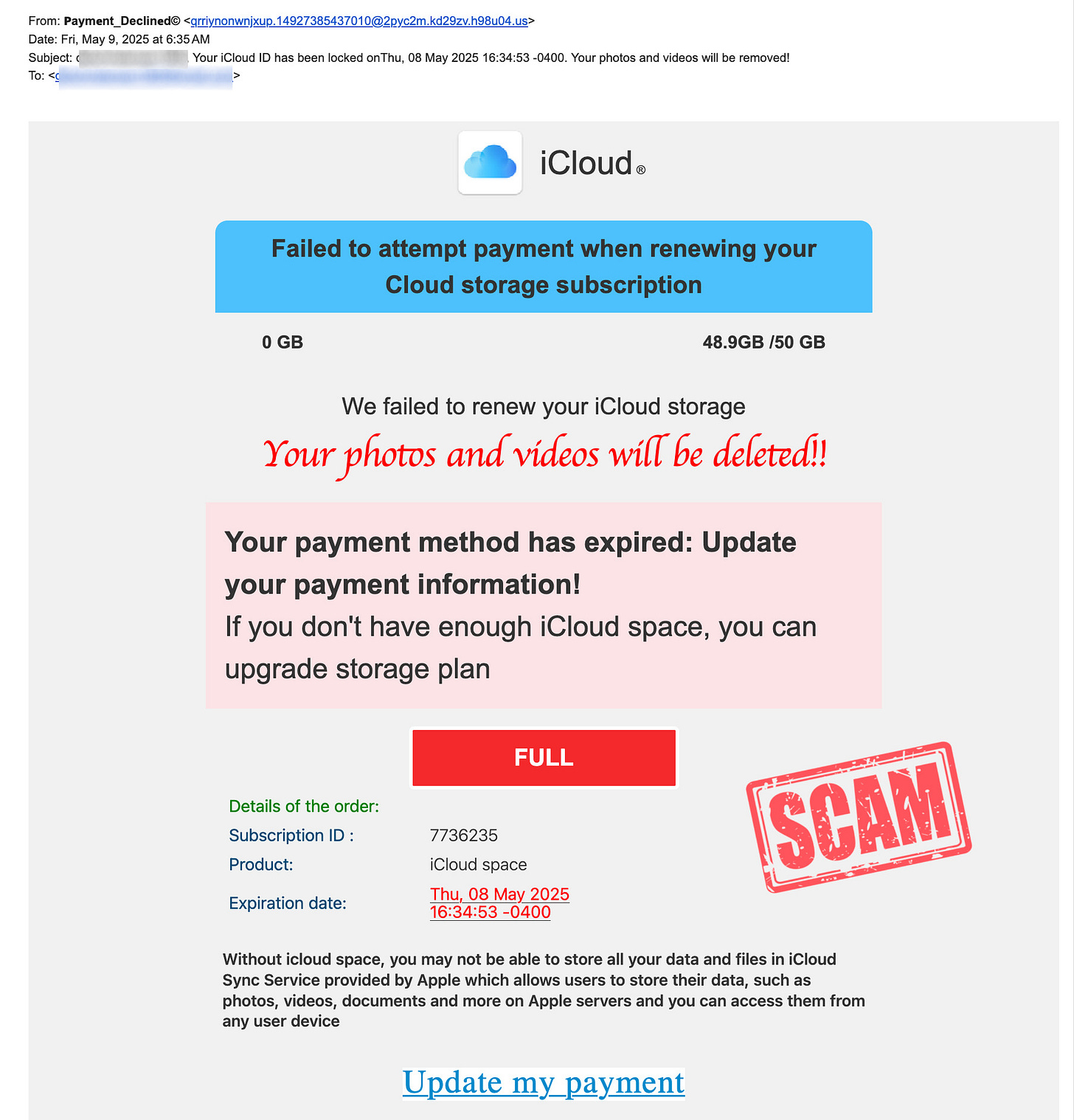Hoax-Slayer - Issue 10
iCloud Phishing, Cigar Arson, Ditching Chrome and more
iCloud Storage Phishing Scam
Apple users are currently being targeted in a phishing campaign claiming that their iCloud storage subscription has failed to renew.
According to the email, your account payment method has expired, and your iCloud ID has been locked. Supposedly, your photos and videos will be deleted if the payment issue is not rectified. The email is a scam designed to steal your information and has no connection to Apple or iCloud.
The scam email urges you to click a link to update your payment and restore access. If you click as instructed, you will be taken to a bogus website designed to look like it belongs to Apple. Once on the fake site, you will be asked to provide your Apple ID and complete a “payment update” form that asks for your name, contact, and credit card information.
Online criminals can use this information to hijack your Apple account, commit credit card fraud, and attempt to steal your identity.
Fake payment failure emails are a common scammer tactic and target users of many different companies. Be wary of any email that claims that a payment has failed. Instead of clicking links in such emails, log in to your account by entering the address into your browser’s address bar or via an official app. You’ll see a notification about any payment problems after you log in.
A screenshot of the scam email:
Burned Cigars Insurance Claim Hoax
This story has been making the rounds online and in print for decades. It's a good one! A lawyer buys an expensive box of 24 cigars, smokes them all, and then files an insurance claim, saying the cigars were lost in “a series of small fires.” Incredibly, the insurance company pays out. But the twist? The lawyer is later arrested and convicted on 24 counts of arson.
It’s the perfect tale of poetic justice: a slick, manipulative lawyer tries to outsmart the system and ends up getting exactly what he deserves. Stories like this are irresistible, especially when they involve lawyers and insurance companies, two widely disliked figures. Who wouldn’t cheer at a tale where a cunning lawyer tries to game the system and ends up hoisted by his own legal petard?
But there’s one small problem: it never happened.
Despite its popularity, this story is an urban legend. No court ever ruled that smoking a cigar constitutes arson. No real lawyer ever managed to pull off this scheme. Early versions of the story didn’t even mention a lawyer—just a “cigar smoker.” Over time, the story has evolved, picking up new details and shifting locations to add realism.
The origins of this tale are murky, but it likely began as a joke. A version appeared in a 1965 Toastmasters manual, and by 1996, it had surfaced on Usenet forums. Since then, it’s been shared endlessly via email and social media and featured on countless humour websites, usually in the "Lawyer Jokes" section.
This is a modern fable designed to amuse, not inform. And like many urban legends, it serves as a gentle reminder: just because something sounds true (and satisfying) doesn’t mean it actually happened.
An example of the circulating message:
BEST LAWYER STORY OF THE YEAR, DECADE AND PROBABLY THE CENTURY!!
Charlotte, North Carolina. USA. A lawyer purchased a box of very rare and expensive cigars, then insured them against, among other things, fire. Within a month, having smoked his entire stockpile of these great cigars and without yet having made even his first premium payment on the policy, the lawyer filed a claim against the insurance company.
In his claim, the lawyer stated the cigars were lost ‘in a series of small fires.’ The insurance company refused to pay, citing the obvious reason, that the man had consumed the cigars in the normal fashion. The lawyer sued.. and WON!
(Stay with me.)
Delivering the ruling, the judge agreed with the insurance company that the claim was frivolous. The judge stated nevertheless, that the lawyer held a policy from the company, which it had warranted that the cigars were insurable and also guaranteed that it would insure them against fire, without defining what is considered to be unacceptable fire’ and was obligated to pay the claim!
Rather than endure lengthy and costly appeal process, the insurance company accepted the ruling and paid $15,000 to the lawyer for his loss of the cigars lost in the ‘fires’.
NOW, FOR THE BEST PART
After the lawyer cashed the check, the insurance company had him arrested on 24 counts of ARSON!!!
With his own insurance claim and testimony from the previous case being used against him, the lawyer was convicted of intentionally burning his insured property and was sentenced to 24 months in jail and a $24,000 fine. This is a true story and was the First Place winner in the recent Criminal Lawyers Award Contest!
ONLY IN AMERICA!
Concerned about Privacy? The Case For Switching from Chrome to Firefox
Here’s an unfortunate truth. Google Chrome knows more about you than most humans do. It’s fast, sleek, everywhere, and the default browser for millions. Until recently, I was one of the said millions.
But I’m increasingly concerned about privacy. Every time I go online, my data is harvested and used to increase the profits, power, and influence of a handful of gigantic companies with no moral compass. These companies (Google, Facebook, Microsoft, and others) have repeatedly shown that they put profits far ahead of privacy, ethics, and common decency. I’m over it, and I’m looking for alternatives.
Sadly, it’s not as easy as you might think to extract yourself from the nefarious clutches of the online tech giants. They are ubiquitous and insidious.
But, it’s doable. My first step? Ditch the Chrome browser and go with Firefox instead.
Here’s why:
What’s Wrong With Chrome?
Google makes money from ads. A great deal of money. And those ads are powered by your data1.
When you use Chrome:
You’re often signed into Google services by default.
Your activity fuels a powerful tracking and advertising machine.
Even in Incognito Mode, some tracking still happens.
Recent updates (like Manifest V3) are making it harder for privacy tools to work effectively.
Chrome isn’t just a browser. It’s a data collection engine with a slick interface.
Enter Firefox
Firefox is made by the non-profit organization Mozilla. The company doesn’t sell ads or collect personal data for profit. Privacy is a foundational feature for Mozilla.
Firefox offers:
Enhanced Tracking Protection that blocks cookies and trackers by default.
Total Cookie Protection that keeps sites from spying on you across the web.
Social Media Tracker Blocking prevents Meta, X, and other social media from following you outside their websites.
Full control over what you share (if anything).
Firefox is open-source, transparent, and continues to improve its privacy and security features.
But, Is Firefox as Good as Chrome?
In my opinion, yes! In fact, on my Mac I find Firefox is considerably less of a resource hog than Chrome. It’s fast, modern, and compatible with everything.
You’ll get:
Smooth browsing on any device
A built-in private browsing mode that actually blocks trackers
Easy syncing across phones, tablets, and desktops
Support for top-tier extensions like uBlock Origin, Privacy Badger, and HTTPS Everywhere
It’s a privacy win with zero friction.
Switching is Pretty Painless
If you want to make the switch, here’s how:
Download Firefox from mozilla.org.
When you install, you’ll be prompted to import bookmarks, passwords, and history from Chrome.
Go to Settings > Privacy & Security to set up your privacy protections.
Install any extensions you need. (I’ve found that all of the Chrome extensions that I use have Firefox versions, but there may be exceptions.)
Start browsing. It’s pretty intuitive.
Switching to Firefox is one of the easiest ways to take back a little control. You’ll browse more privately, more securely, and with the knowledge that you are not being used quite as much to further the greed-driven aspirations of some morally bankrupt tech giant.
Can You Help Support Hoax-Slayer?
If you find this publication useful, you can help in three ways:
#1: Spread the word: You can share this post or tell your friends about Hoax-Slayer:
#2: Buy Me A Coffee: Make a one-off (or regular) donation of an amount of your choosing:
#3: Become a paid subscriber: For just $6 (USD) per month, you can give vital ongoing support to Hoax-Slayer. What do you get for a paid subscription? I don’t believe in locking content about scams and security issues behind a paywall. So, the newsletter is the same for both free and paid subscribers. But you WILL get:
A warm fuzzy feeling from knowing that you are helping to thwart scammers and increase awareness by supporting the Hoax-Slayer project.
The chance to ask questions or make submissions via the exclusive subscriber-only chat.
Thanks! Any support that you offer will be greatly appreciated.
Quick PayPal Security Tip — Check the Greeting in Emails
Because PayPal primarily communicates with its customers via email, scammers constantly target the company using email phishing campaigns.
Some of these scam emails are crude and easily recognizable as fraudulent. Others are quite sophisticated, and, at least at first glance, they may look like genuine PayPal notifications.
Here’s a tip that can often help quickly identify a fake PayPal email. Genuine PayPal notification emails will ALWAYS address you by name. They will NEVER use a generic greeting such as “Dear Customer” or “Dear [your email address]”. Nor will they omit the greeting altogether, as some scam emails do.
So, if you receive an email that uses a generic greeting that does not include your name or does not have a greeting, be very wary. Don’t click any links or open any attachments that the email contains.
Remember, it is always safer to log in to your online accounts by entering the address into your browser’s address bar or via an official app.
You can report PayPal phishing scams via the reporting address listed on the company’s website.
A typical PayPal scam email:
Full disclosure: I used Google Ads to generate revenue in an earlier incarnation of Hoax-Slayer. At first, it was fine. It simply showed ads related to the content I was writing about. But, over the years, Google’s insidious and increasingly unethical tracking and privacy violations became worse and worse to the point where I was no longer willing to use Adsense.









Thanks, Brett. I used Firefox for years, and maybe it's time to revisit. I appreciate the helpful info and enjoy reading your posts.